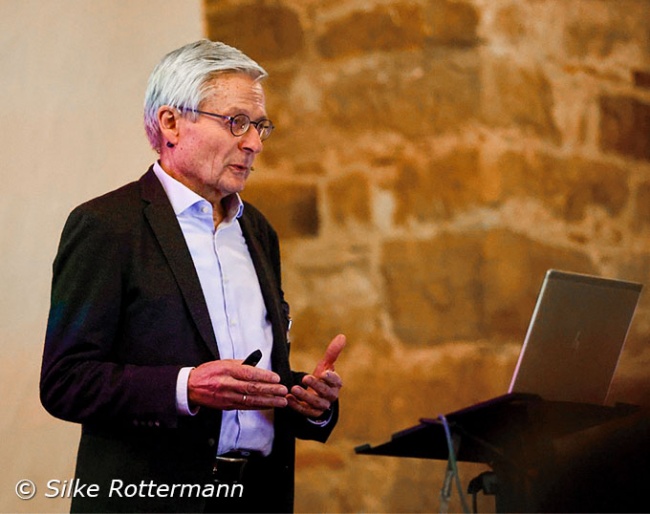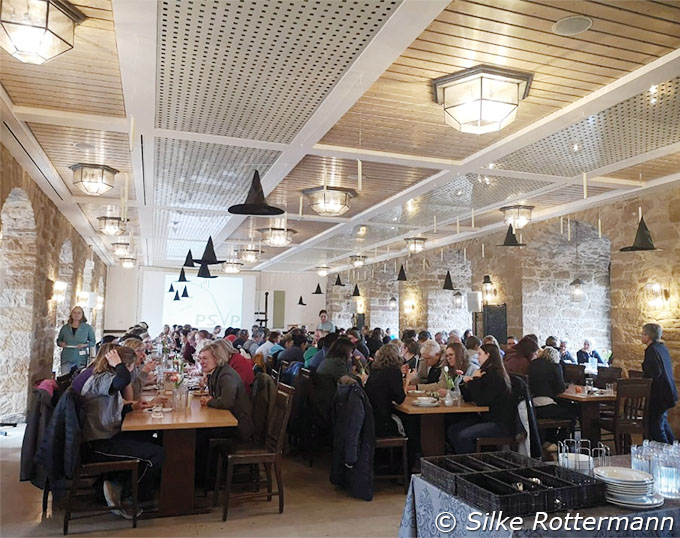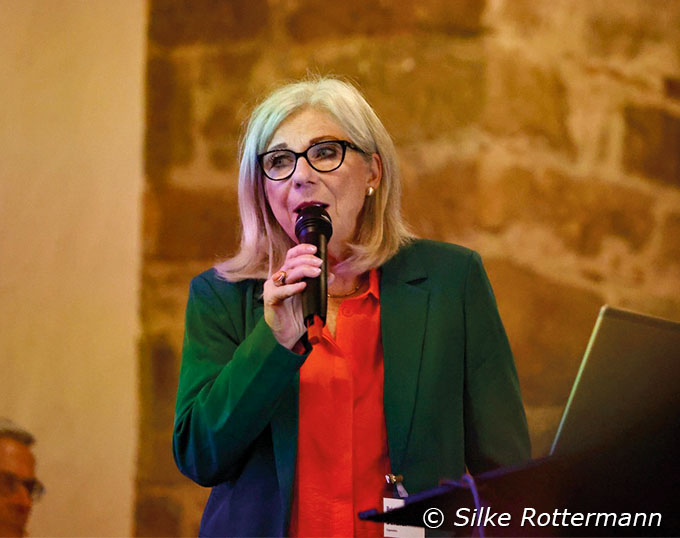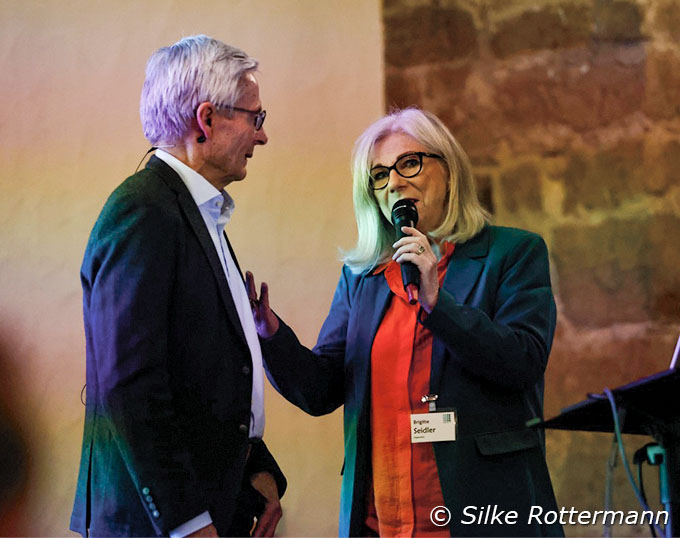
-- Text and Photos © Silke Rottermann for Eurodressage
When the driving force behind this mega-event, Brigitte Seidler, chose the motto "Today for tomorrow" for her 5th edition of the so-called "Burgtagung" (Meeting at the Fortress) she certainly could not anticipate how totally current it would become when the event actually took place from 9 - 11 February 2024 near Bad Dürkheim in the south of Germany.
Burgtagung
Officially called „Palatinate Training Conference“ and organized by the Horse Sport Association Palatinate, this three-day seminar is somewhat unique in that it brings together a whole bunch of renowned riders, trainers, vets, therapists and judges who hold different workshops for the participants.
Created in 2015 by Brigitte Seidler, chair of the association, originally to offer the trainers of the 110-member clubs of the Horse Sport Association Palatinate a high class possibility to educate themselves on a variety of topics, the event now attracts participants far beyond the borders of the German state of Rhineland-Palatinate. In 2024 people also came from Austria and Switzerland and even flew in from Finland to take on the opportunity to meet like-minded people and learn from some of the best.

took place and after which this 3-day-conference is named
Opening Lecture by Plewa
When I arrived at the Burgtagung I already had a long working day behind me. I had dropped off my dog at friends and picked up fellow Eurodressage author and trainer Niina Kirjorinne, who had flown in from -25 degrees in Finland to a mild +12 ° C degrees at my home. I was happy the dinner was already waiting for us after an easy 80 minutes drive.
The big so-called „Knight’s Hall“ with its long tables was buzzing with people, and „big names“ were mixing and mingling with those who were awaiting their wealth of knowledge in the weekend to come. As we were one of the last to arrive, the hall was so absolutely crowded that we took two chairs and found a space near the small stage at the end of the hall to sit and listen to the opening lecture of the event: „Today for Tomorrow“ by former O-judge Dr. Dietrich Plewa.

Where is Dressage Heading?
In the lead-up to the Burgtagung the Helgstrand and Parra scandals as well as the judging at the last leg of the World Cup in Amsterdam had not only dominated the equestrian media and social media channels, but it was also one of the topics of the day during the get together part of the event. It seemed everybody awaited Plewa to take a stand in his lecture and he did not disappoint.
The motto of the entire event, which was also the title of his lecture („Today for Tomorrow“), had gained special and serious relevance as the recent scandals poured oil in the fire of many animal rights activists and those parts of the public which consider equestrian sport generally as abuse.
Referring to the recent incidents, Plewa began his lecture by mentioning that equestrian sport is not anymore reaching a cross-road, but is currently living on a razor's edge. The 76-year-old, who is retired from international judging, stressed that dressage does not mean to dress (in the circus sense), but to use the natural talents of a horse. At the same time he asked if one has not gone too far regarding these natural assets. Dressage for him means training and the goal has to be a willing cooperative horse which executes dressage movements in harmony with his rider, technically well, relaxed and expressive.

welcomes the almost 200 auditors in the historic Knight’s Hall
Attacking Formalistic Points
However, dressage increasingly sees itself confronted with public criticism which according to Plewa is mainly based on formalistic points of views, such as if the poll is the highest point, if the nose is in front of the vertical, if the neck is tight or the contact problematic. "Because criticism is linked to such formalities, it is easy for the public to criticize us judges, but partly this happens for a reason," Plewa admitted rather frankly.
At the same time he asked for a more differentiated way of looking at things: "Even a well trained horse can come shortly behind the vertical, still this has to be shown in the marks given by the judges." Plewa showed his incomprehension that a horse at last year’s European championships managed to place in the top 15, even though according to him the horse (except for the extended walk) went permanently in the same frame.
Whereas he made clear that not all public criticism is per se fitting or justified, he confessed that the tolerance in the judges’ boxes regarding deficits in the basic training, like the contact or suppleness, is too big. Things which the laymen public considers as deficient is not enough mirrored in the awarded marks.

gave the auditors food for though
He summarized that dressage has never been and never will be a popular sport, but it definitely requires popularity and a skilled defence towards unjustified criticism. To him, who has seen the sport in all its aspects, the way to achieve these essentials are a training which takes the horse’s individuality into account, competent trainers and an objective, comprehensible, fair and skilled judgement from the judges.
"Nothing has to be whitewashed, but an offensive enlightenment which characterizes good dressage sport is necessary," Dr. Plewa concluded his lecture to thunderous applause from almost 180 auditors in the Knights Hall.
Soon coming about Burgtagung conference:
Dr. Britta Schöffmann: In the past all wasbetter, wasn’t it?
Anja Beran: Schooling the eye
Anja Beran and Uta Gräf: Fair and delightful dressage training